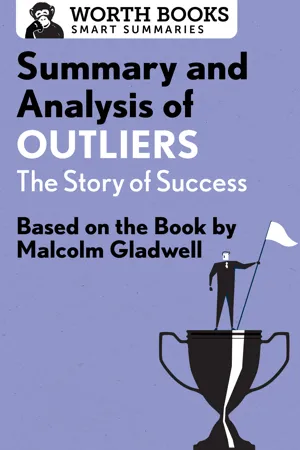![]()
Summary
Introduction: The Roseto Mystery
The insular town of Roseto, Pennsylvania, populated by descendants of Italian immigrants from Roseto Valfortore, Italy, is a curious medical anomaly: As early as the 1950s, the rate of heart disease and other ailments there was shockingly lower than the rest of the United States. Societal ills such as substance abuse and crime were also strikingly scarce. So what set Roseto apart? As physician Stewart Wolf discovered, the obvious potential causes—a healthy lifestyle, diet, genetics, and so forth—didn’t seem to be in play. Instead, he concluded that the distinctive sense of community in the self-contained town—for instance, neighbors greeting one another, multiple generations of a family sharing a home, an overall “egalitarian ethos”—had a positive effect on the population’s health and quality of life. Gladwell frames this surprising, paradigm-shifting lesson about health as an analogy for the argument Outliers will make about success.
Need to Know
Health may not be entirely about an individual’s constitution or life choices—it has a lot to do with the cultural context in which a person lives. And that same principle may apply to personal success.
We’re accustomed to thinking of success as the result of some special, almost magical talent that allows individuals to shine and overcome any obstacles in their path, no matter what advantages they have or haven’t been given. (Think of the classic “pulled himself up by his bootstraps” narrative.) But Gladwell is making the case that we are affected by the circumstances we’re born into and the happy (or unhappy) situations we encounter in our lives.
To wit: An astounding number of Canada’s elite junior hockey players were born in January, followed by February and March. This phenomenon can be explained by the fact that the age cutoff for youth hockey is January 1—so boys born in January could be playing with kids almost a year younger, which almost guarantees that the older players will stand out as having better ability. As coaches winnow down their teams to their perceived “all-stars,” these older boys are more likely to be selected for the elite squads … and hence to receive an advanced level of training and increased practice opportunities that help them develop their abilities and—literally—skate to success. (This phenomenon is also observed in other age-eligibility-limited sports, such as soccer.)
Need to Know
The “Matthew effect”—so called for the Biblical verse Matthew 25:29, which says that those with advantages will be given more, while those without will have theirs taken away—is a kind of snowball effect. An arbitrary advantage (such as one’s date of birth relative to competitors) may well be rewarded with further opportunities, which reinforce the perception of superior ability and lead to ever more opportunities … and so the achievement gap just keeps widening.
What does it take to turn talent and drive into success? We might think the answer lies in some ineffable quality or stroke of fate. Turns out, it can be quantified: by at least 10,000 hours spent practicing and honing one’s gifts. And often, getting the chance to log those 10,000 hours of focused effort hinges on being in the right place at the right time.
Some striking examples: Bill Joy, cofounder of Sun Microsystems and widely considered to be a groundbreaker in modern computing, had the good fortune to attend the University of Michigan, where a then practically one-of-a-kind computer center became his second home. Mozart is often cited as a prodigy for composing concertos starting at age 6—but his work didn’t reach masterpiece level until he was 21. By the time of their American “Invasion,” the Beatles had honed their talents performing hundreds of marathon gigs in Hamburg, Germany, sometimes clocking eight hours at a stretch.
And finally, one of the ultimate outliers, Microsoft cofounder Bill Gates, had the stunning good luck to start seventh grade at a private school with a computer club funded by students’ parents—a resource that the vast majority of college students didn’t have at the time. Gates was one of a generation of tech pioneers born in or around 1955, a demographic sweet spot for nerds due to the transformational innovations in technology that were taking place as they came of age.
Need to Know
Malcolm Gladwell isn’t denying that innat...
